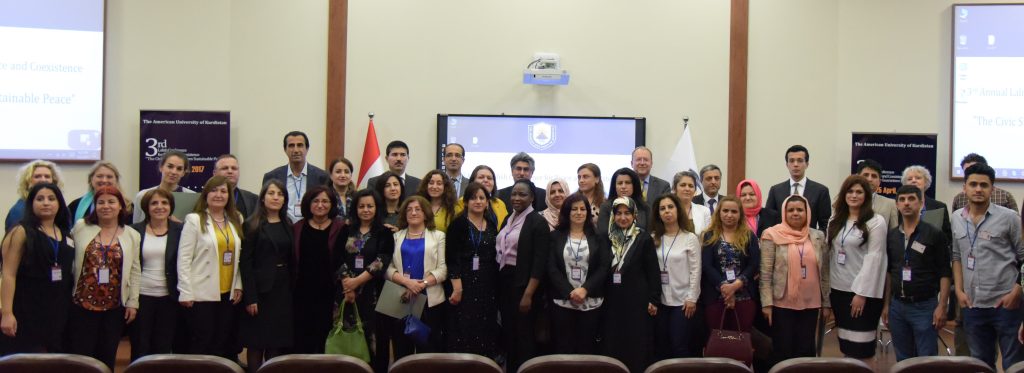Genocide in Iraq and the KRG: Prevention and Accountability
Duhok, Iraqi Kurdistan – April 25, 2017 – Local and international experts in genocide and war crimes gathered today at The American University of Kurdistan for its third annual Lalish Conference on Peace and Coexistence. The title of this year’s conference, hosted by AUK’s Center for Peace and Human Security, was “The Civic State Guarantees Sustainable Peace.”
This year’s keynote speaker was Simon Minks, a senior public prosecutor for The Hague Court of Appeal. Minks said that even obvious cases of genocide can be difficult to prosecute. “We’ve had bad experience with states that did not want to cooperate.” He stressed the importance of careful documentation and the need to scrutinize personal testimony.
The first panel examined the causes and conditions of recent atrocities. Elisa von Joeden-Forgey, professor of holocaust and genocide studies at Stockton University, called the massacre at Sinjar “the clearest case of genocide since 2014.” She seconded the keynote speakers’ admonition to maintain records.
Irene Massimino, professor at the Universidad de Tres de Febrero in Argentina, explained the challenge the international community faces in protecting minority groups. “How can we help without bringing more destruction to the culture?”
The next panel discussed the effects that Kurdistan’s independence might have on women in the region. According to Naznaz Qadir, an education advisor for the KRG’s Council of Ministers, “the liberation of Kurdistan will be the liberation of women in Kurdistan.”
Behar Ali, the director of the Emma Organization for Human Development, agreed, saying, “Remaining in Iraq [would] hinder women’s progress in Kurdistan.”
The last panel addressed the effects of war on women. Nikki Marczak, the Australian director of Yazda, discussed the enslavement of Yezidi women. By enslaving women, Marczak explained, ISIS attempted to disrupt the “transmission of identity” in Yezidi’s patrilineal culture. She also noted that ISIS’ policy of forced conversion was typical of genocides.
Niemat Ahmadi, president of Darfur Women Action Group, described the role of rape in genocide: “The use of rape is very, very systematic. It’s not just the rape itself but the humiliation and the intent…the entire society is victimized.”
The founder of Genocide Watch, Gregory H. Stanton, said that men were the sole architects of genocide and suggested that the decline of patriarchal societies would result in a more peaceful world. “The world would be better off if women were educated and empowered culturally, religiously, and politically.”
This year’s Lalish Conference for Peace and Coexistence was sponsored by Women Leaders of Peace Group in Kurdistan, Genocide Watch, International Association of Genocide Scholars, and the Emma Organization for Human Development.
The Center for Peace and Human Security was established at AUK in 2015 in order to study and serve minority groups in the region.


